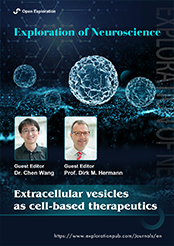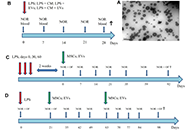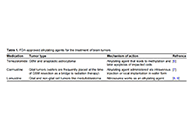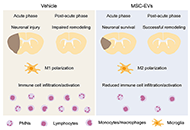
Extracellular Vesicles as Cell-based Therapeutics
Guest Editors
Prof. Dirk M. Hermann E-Mail
Professor of Vascular Neurology, Dementia and Ageing Research, University Hospital Essen, University of Duisburg-Essen, Essen, Germany
Research Keywords: Ischemic stroke, neuroprotection, neurorestoration, stem cells and extracellular vesicles
Dr. Chen Wang E-Mail
Department of Neurology, and Center for Translational and Behavioral Neurosciences, University Hospital Essen, University of Duisburg-Essen, Essen, Germany
Research Keywords: Ischemic stroke, neuroprotection, stem cells and extracellular vesicles, immunomodulation
About the Special lssue
Extracellular vesicles (EVs) are lipid bilayer-enclosed nanoparticles naturally released by virtually all cell types. Based on their biogenesis and size, EVs are typically classified as exosomes (60-150 nm), microvesicles (100-1,000 nm), and apoptotic bodies (50-2,000 nm). EVs carry various cargos such as proteins, lipids, nucleic acids, and organelles from their parental cells and have wide-ranging biological effects including mediation of intercellular communication, promotion of tissue regeneration, maintenance of tissue homeostasis, and immunomodulation. EVs’ diverse functions have attracted intense attention and EVs have emerged as a novel therapy option for neurological diseases, such as stroke, Alzheimer's disease, and multiple sclerosis. Despite extensive advancement in EV research, considerable challenges remain to be overcome before EVs can be applied in clinical practice.
To prompt the development of EVs as novel neurotherapeutics, we welcome and appreciate studies evaluating therapeutic effects of EVs in neurological disease models, including but not limited to, investigating the efficacy of EVs, elucidating the mechanism of action and site of action of EVs, exploring EVs as disease biomarkers, engineering EVs as drug carriers, and identifying EV potency assays.
Keywords: Extracellular vesicles, neurotherapeutics
Published Articles


